A Travel Story
Viji Narayanan
July 10, 2022
I love to travel. I have always been passionate about traveling across different countries and learning about various cultures. Deriving from Clifford’s (1997) article on travel culture, I can appreciate why he would concur with the philosophy that the cultural evolution of a person depends not on what he is and what he has, but on where he comes from and where he goes. Clifford’s constant reference to a “hotel” emphasizes that culture is not bound to a place, but rather a space of modern movement for travelers.
Thirty years ago, I migrated from India to the United States. While I was growing up, my parents did not travel for pleasure. As my dad moved from one place to another because of his job, my family did not travel much, as they preferred to stay in one place during downtime. So when I got married to an avid travel enthusiast, I realized I loved traveling as well. As of now, I have traveled to fifty-five countries and wish to cover all inhabitable countries in the next fifteen years.
Learning about various indigenous cultures had always fascinated me. I am also curious about how we are all connected globally despite the cultural divides, linguistic barriers, and genetic differences. Living in the U.S. over the past thirty years, after spending almost all my adolescent years in India, and traveling to different countries has really helped me appreciate the ingenuity of different cultures and shaped my outlook on life. An empathic, secular, and egalitarian individual.
Amongst the countries I visited, there is one country that merits special mention, and that’s Costa Rica! We were able to travel this spring after Costa Rica opened its borders following Covid. In this essay, I would like to share a photo travelogue that captures the beauty of the place as well as its ecotourism quality. As Costa Rica is solely dependent on tourism, it was wonderful to see how they recovered from their sluggish economy post-Covid onslaught.
After landing in the capital of Costa Rica, we were whisked off in a private bus to Monteverde which is a three-hour drive from San Jose. Montverde is one of Costa Rica’s most popular eco-tourism destinations. During the drive, I was captivated by the lush greenery of rich forests full of life. Our hotel at Monteverde was located at the top of a hill. It emphasized eco-friendliness, and they did not serve water in plastic bottles. The masks were mandatory as they were afraid to close their country again due to covid spread. Visitors were required to wear masks at all times except when they were outdoors. We stayed mostly in eco-friendly hotels with no air conditioning, as the weather was pleasant and breezy.
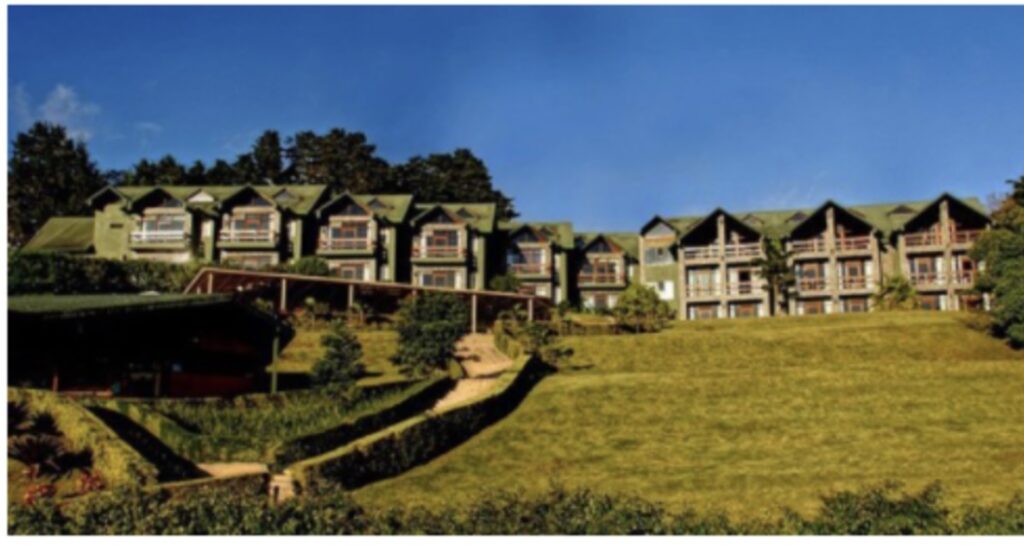
After a comfortable rest at the hotel, we went out for a hike. Montverde’s rain forests are well known for their rare bird species, like the resplendent quetzals and emerald toucanets that thrive there. During our hike, we could spot one or two of these rare species through binoculars, as shown below.
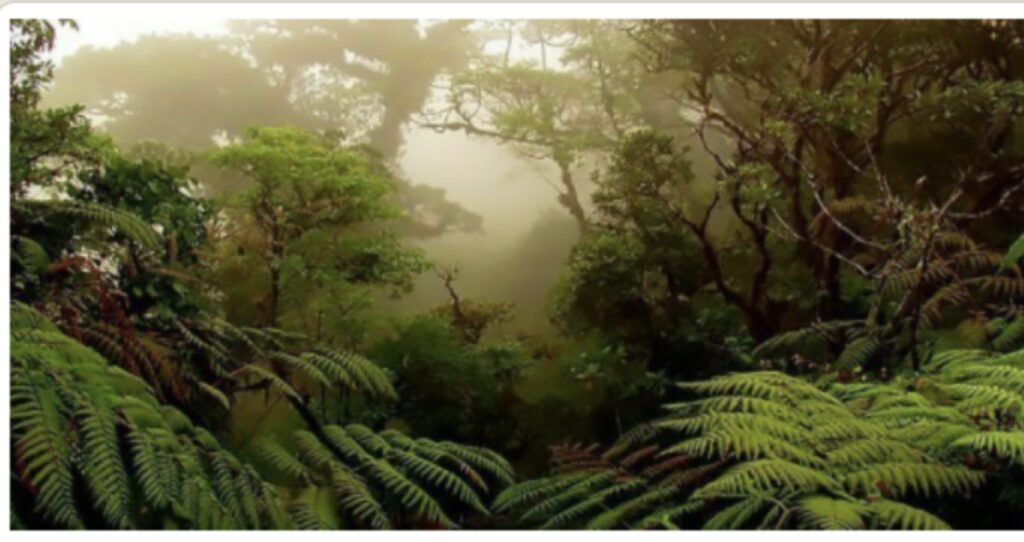
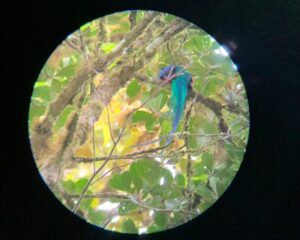
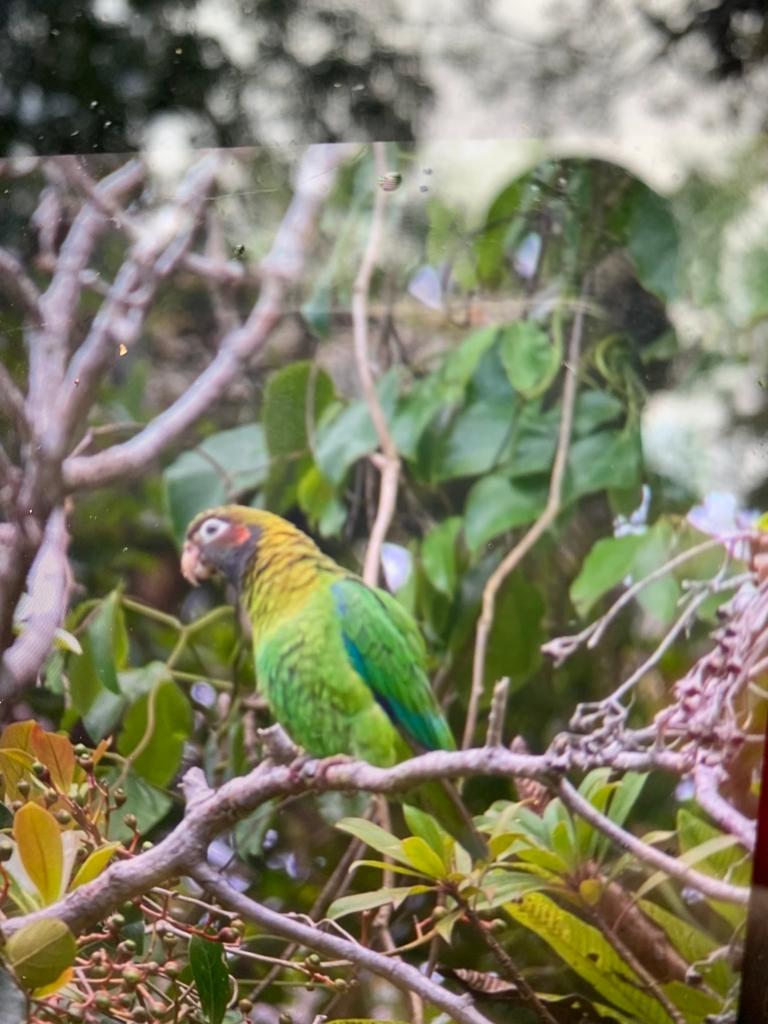
Costa Rica contains nearly 6 percent of the world’s biodiversity, despite occupying only 0.03 percent of the earth’s surface. During our hikes and safaris, I noticed that Costa Ricans take great pride in preserving and restoring their wilderness. They are very protective of their environment and don’t like visitors hurting their species. While walking through their forests, listening to monkeys chirping and birds cooing, the air felt tranquil and pure. The waterfall was the icing on the cake.
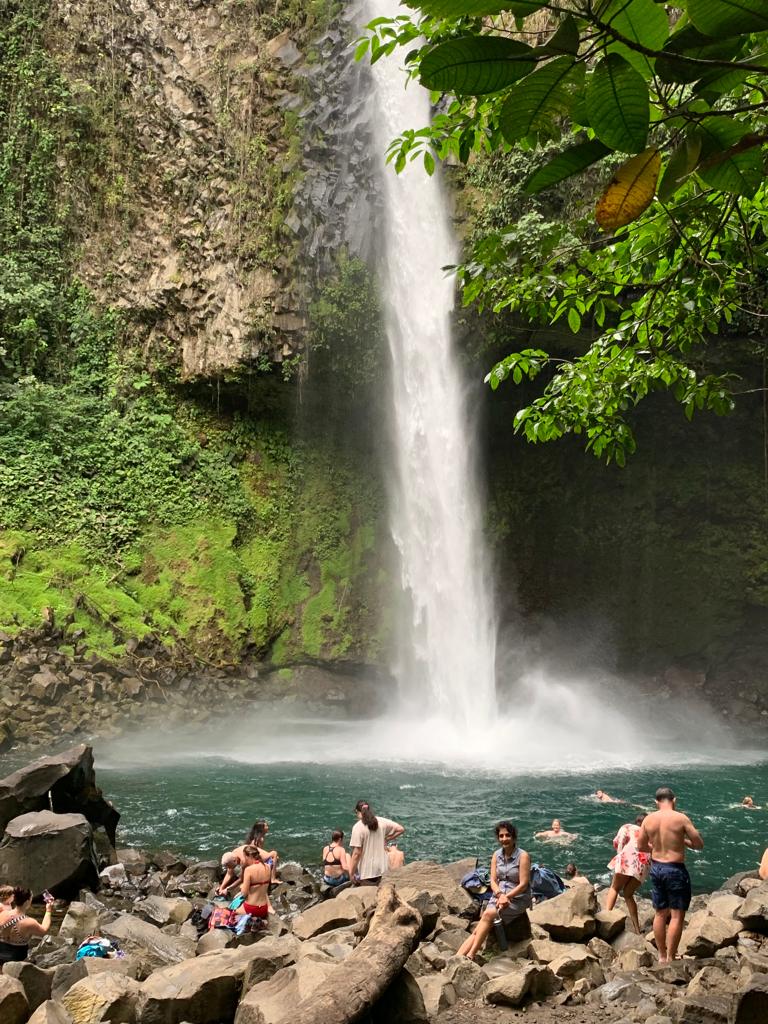
As we were resting in our room after a hike, suddenly my daughter screamed and I looked over to see a lizard crawling along the side of her bed. After telling her not to panic, I gently scooped it up with a tissue and tossed it outside the window without harming the animal.
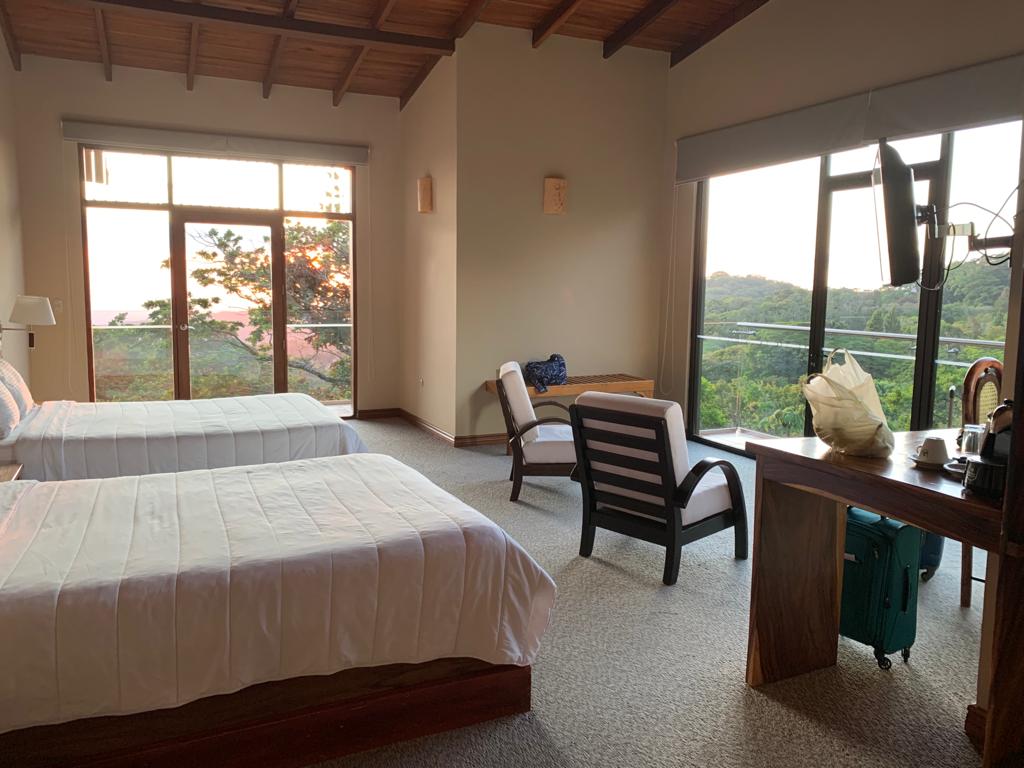
My husband found it amusing but also brave of me. However, when I reflected upon my own behavior, I found myself surprised at what I had done. Costa Ricans’ protective nature about their species probably shaped me, given how I grew up in India fearing the presence of giant spiders and lizards in your bathroom. In this country, it is common to see iguanas, another type of lizard family member.
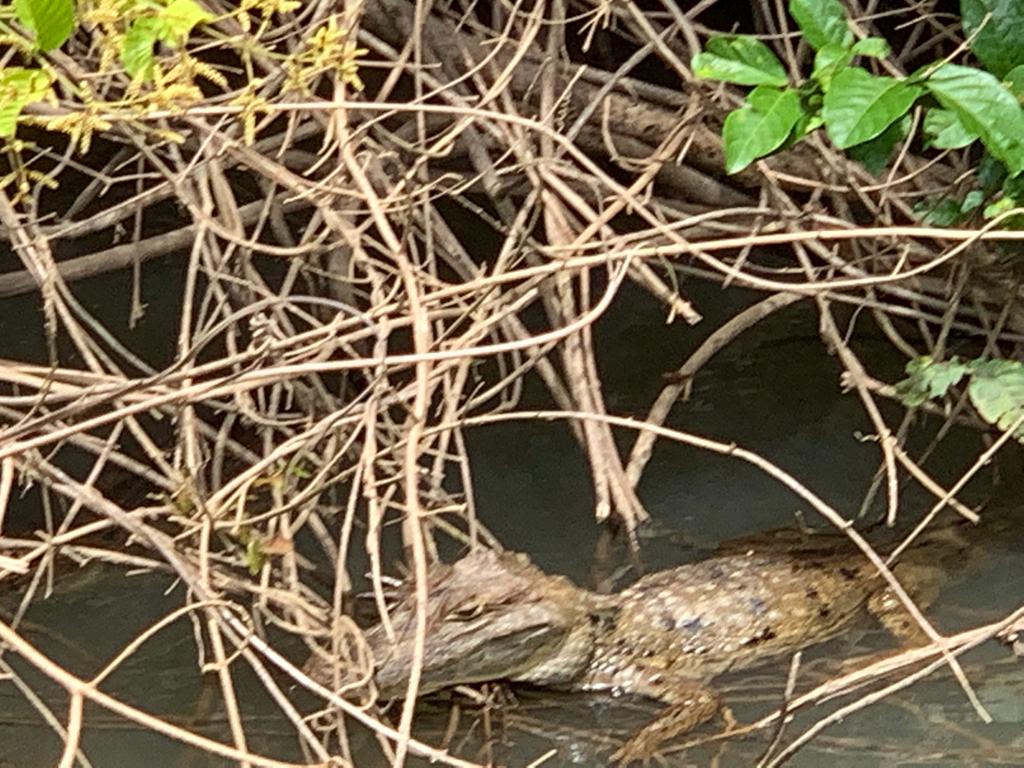
Our next stop was Arenal Volcano Springs. From your room, you could enjoy the beauty of the Arenal mountains with the imposing volcano.
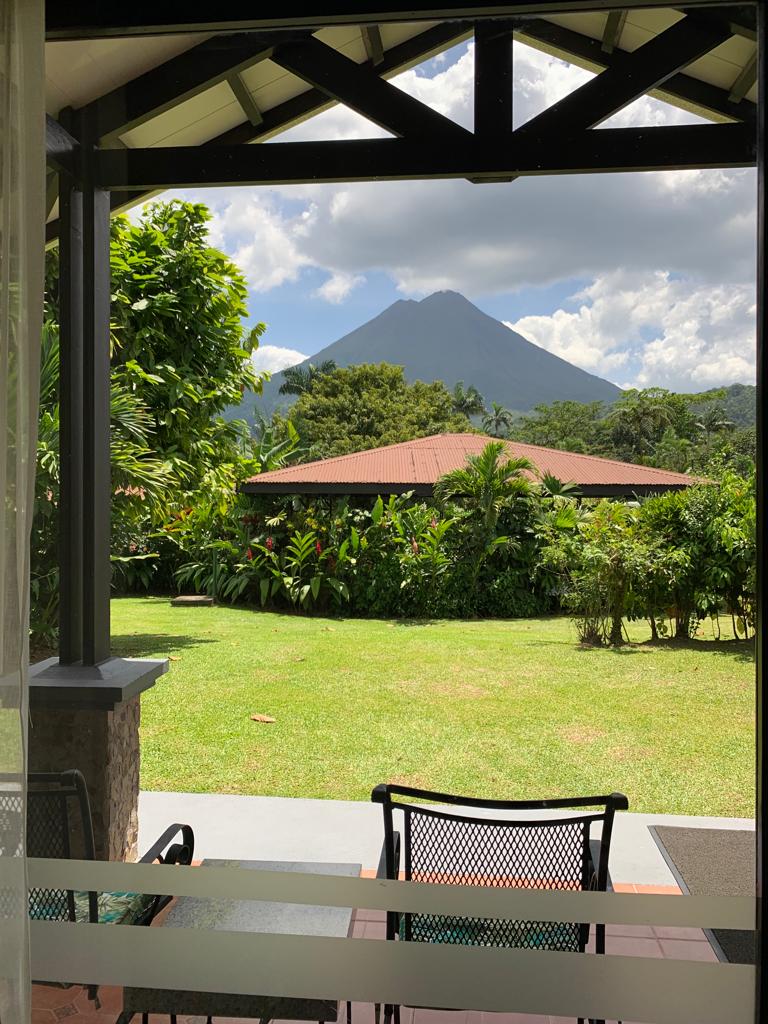
Although the volcano was dormant, you could see gas spewing from it. The hot spa in the hotel is supposed to have healing properties due to the sulfur in the springs. We soaked our tired legs, hoping to heal all the aches from walking through the forests. The ambiance of the hotel was breathtaking, and the staff was friendly and helpful. Even though I saw many rude customers, I did not see any aggressive staff members blowing their steam at them. I was not surprised, as they lead a stress-free life and wondered why would anyone be in a foul mood?
Since the local people practice organic farming and most of their farms are pesticide-free, our lunch was delicious. Fresh seasonal fruits and vegetables are a source of pride for them. The following picture shows their traditional Costa Rican meal of beans and rice and fresh vegetables. As a vegetarian, I did not have any meat. However, their traditional meal includes meat, chicken, and seafood.
Our next stop was the local coffee plantation, which is one of the main attractions in the area. I was fascinated by the process of producing coffee and chocolate, and we enjoyed tasting the indigenous flavors. The most interesting fact is that they do not export any of their cacao, as they take pride in brewing only the best quality cacao. To support their domestic needs, they keep their goods locally. They are very self-sufficient in their local consumer market and do not rely on other countries for their goods.
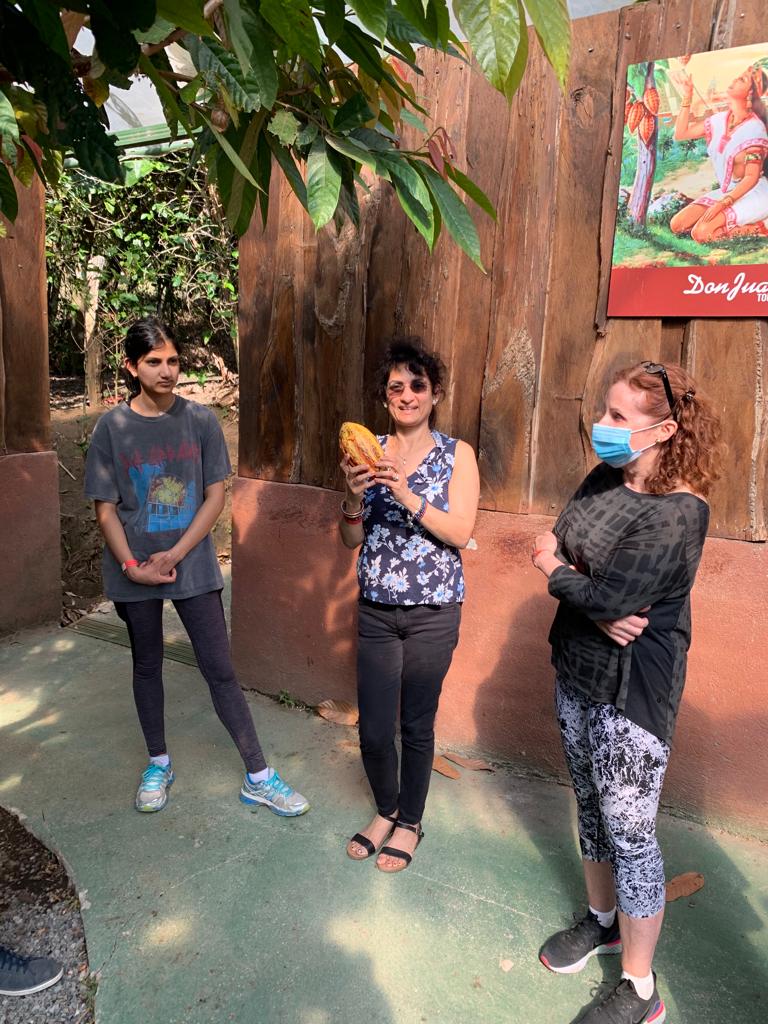
After tasting about twenty flavors of coffee, and a quick tour, we decided to come back to our hotel. During our return trip, our driver surprised us by stopping at a local Indian restaurant. Since we are Asian-Indians, we always look for Indian food wherever we go. I was quite surprised to find this immigrant from India opening his restaurant in Costa Rica. Having married a Costa Rican online, he took the drastic step of migrating to Costa Rica and opening a local Indian restaurant. As the vegetables were so fresh, the dinner tasted delicious, but it also had a blended Costa Rican flavor. The owner clarified that it was intentional to attract the locals. However, he prepared an authentic Indian meal for us. After our meal, the owner served us his special masala tea. He was also extremely thrilled to meet a fellow Asian-Indian and converse in our local language. As Clifford (1997) said, roots come before routes.
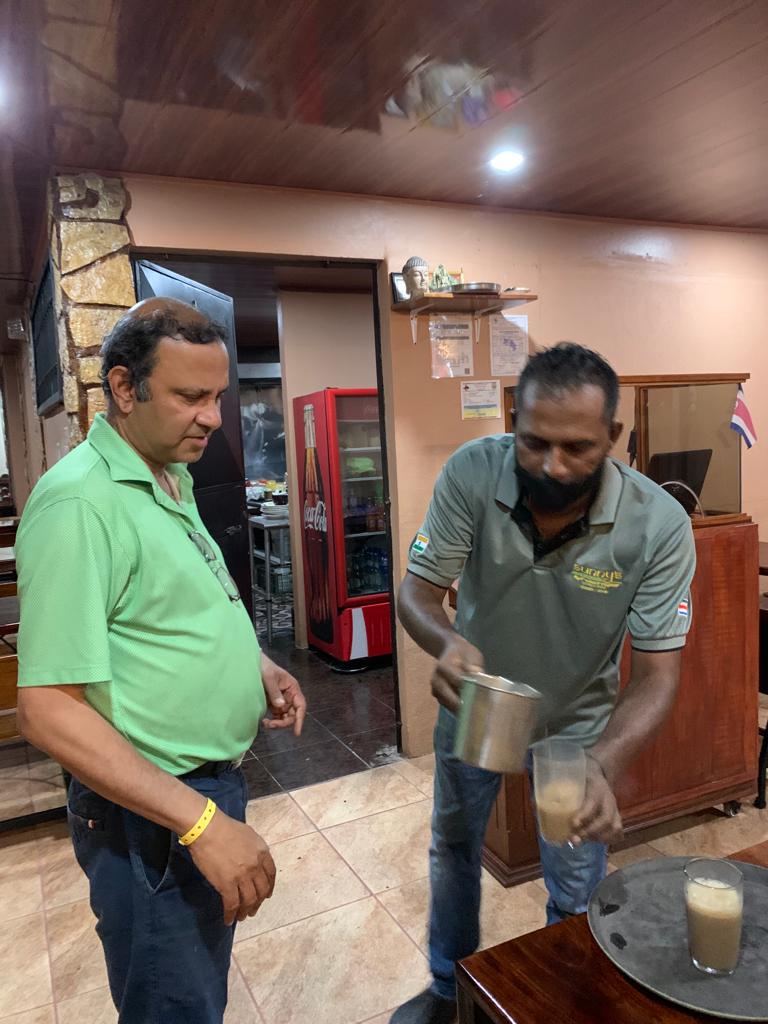
The next day, after a restful night, who wouldn’t want to try something adventurous especially since Costa Rica is the birthplace of ziplining? Ziplining was the ultimate highlight of my trip considering I had never ziplined before. It was evident that the locals had grown up in lush forests and had an adventurous spirit. The locals’ spirit inspired me to swing from tree to tree with complete abandon.
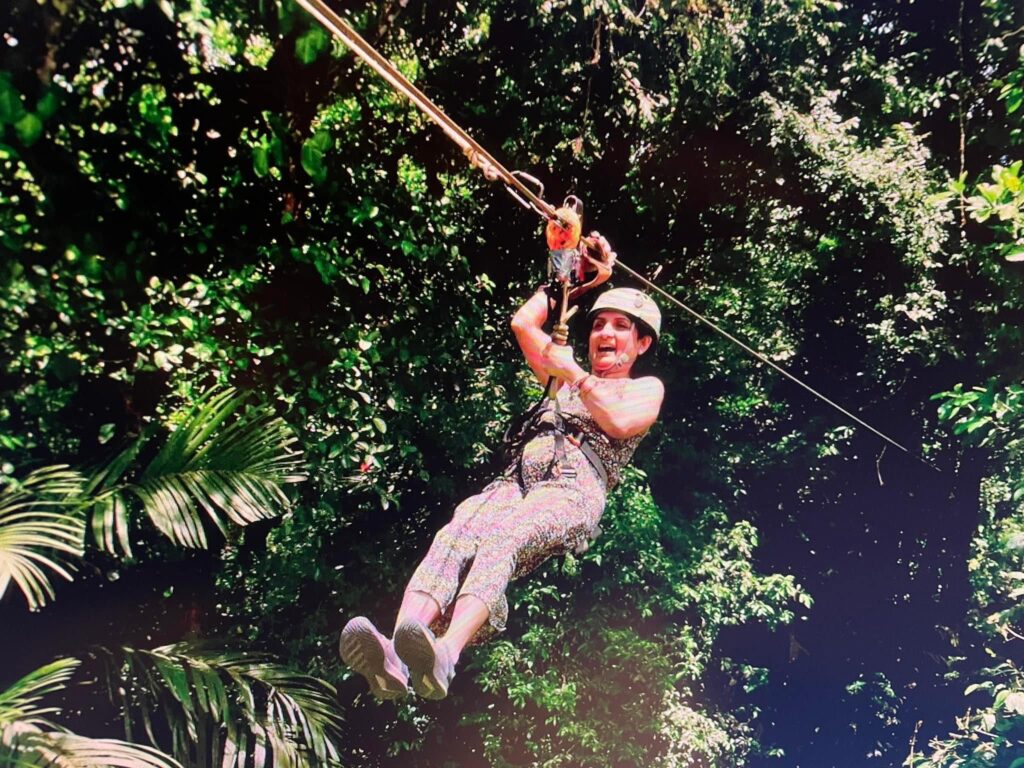
Lastly, we enjoyed some beach time in Manuel Antonia to end our trip. Manuel Antonia was one of those sleepy towns where everyone was very relaxed and laid back. This was a great last stop before flying out from San Jose, as the energy was contagious.
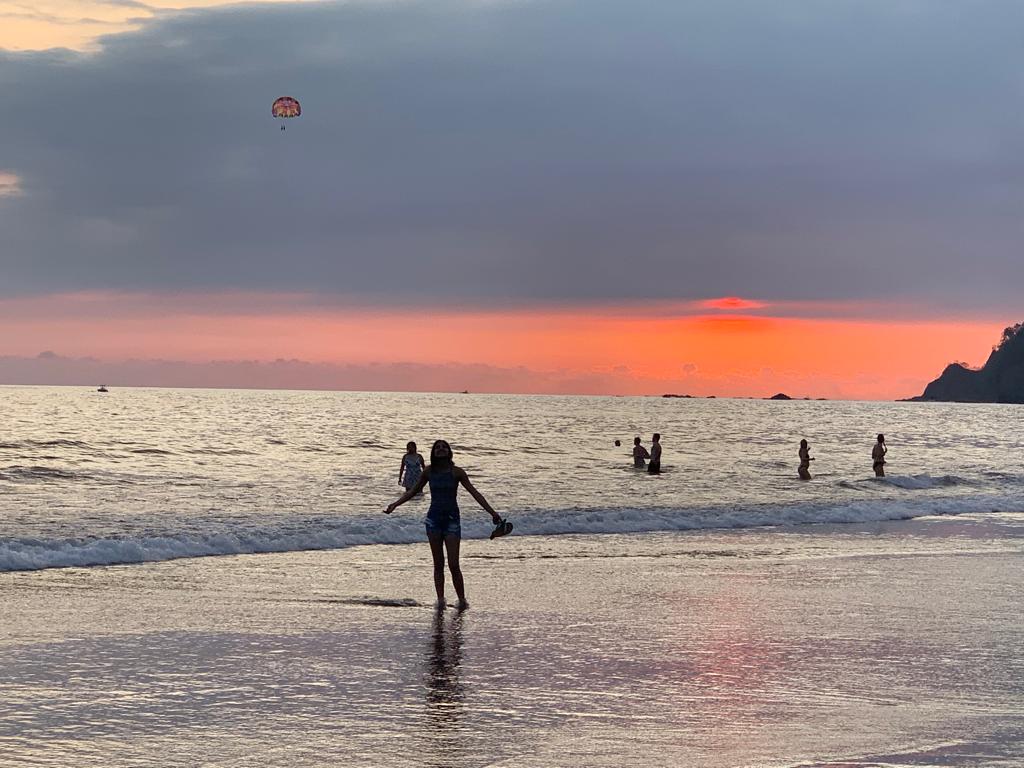
San Jose, however, was a completely different experience. While strolling down the main street, we were suddenly stopped by two cops who asked us to watch our chains and wallets. As a result of the slowing economy, there had been many robberies lately. It surprised me how friendly the cops were since I felt they didn’t want any tourist disaster to damage their economy. Due to fear of theft, all the shops closed early at 6 pm, and we hurriedly checked into our airport hotel. Now I know why the tour guide didn’t recommend staying in San Jose.
In summary, I loved Costa Rica for the following reasons: Its biodiversity and eco-friendliness were unmatched. In addition to my observation, our tour guide and the cab driver answered lots of my questions about their local economy. Their country relies on solar power for 99% of its electricity. The Costa Ricans are peace-loving people, so they don’t have military or guns. In fact, they even welcome refugees from war-torn Nicaragua as refugees. Their defense budget is spent on education. However, one disadvantage was that it was hard to find English-speaking people, but our driver spoke fluent English due to his relocation from the U.S. During our conversation, he mentioned that the government disbanded the military to focus on educating the future generation in English so they would be comfortable if they moved elsewhere. Additionally, all schools and colleges are funded by the government.
Since people are healthy and don’t feel the need to see a doctor, towns do not have many medical clinics. Although our cab driver felt it would be an encumbrance in case of an accident. Regardless of their profession, the government provides them with free health care after 65. Everyone receives a pension plan irrespective of their work. The health care system is minimal and almost free. They have banned plastic and bottled water in almost all the hotels, and the entire country is plastic-free. Finally, I concluded, that all other developed countries, especially Russia, have a lot to learn from them. My salute to this country!
P.S: I forgot my phone on the way to Costa Rica and completely detoxed from it all for ten days. It felt good to disconnect from social media and soak in the beauty of nature. Pure Bliss!
References
Clifford, James. 1997. Routes : Travel and Translation in the Late Twentieth Century. Cambridge, Mass.: Harvard University Press.